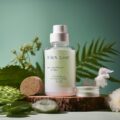Understanding Acne: More Than Just Skin Deep
Acne is often viewed as a surface-level problem, but it’s important to recognize that our skin is a reflection of our overall health and wellbeing. While spot treatments can provide temporary relief, they often fail to address the root causes of acne. This article explores a more compassionate and holistic approach to achieving clear, healthy skin.
The Limitations of Spot Treatments
Spot treatments have their place in acne care, but relying on them exclusively can be counterproductive. These treatments often dry out the skin, potentially leading to more oil production and irritation. Moreover, they don’t prevent new breakouts from forming. By shifting our focus from reactive spot treatments to proactive, whole-body care, we can create an environment where clear skin can thrive.
Nourishing Your Skin from Within
A holistic approach to clear skin starts with nourishing your body from the inside out. Consider these gentle ways to support your skin’s health:
- Stay hydrated by drinking plenty of water throughout the day
- Eat a balanced diet rich in fruits, vegetables, and omega-3 fatty acids
- Get adequate sleep to allow your body to repair and regenerate
- Manage stress through meditation, yoga, or other relaxation techniques
Remember, these changes aren’t about perfection, but about nurturing your body and skin with kindness and care.
Skincare Rituals: A Act of Self-Love
Your skincare routine can be more than just a series of steps – it can be a daily ritual of self-love and care. Here’s how to approach skincare with compassion:
- Cleanse gently, avoiding harsh scrubbing that can irritate the skin
- Use a non-comedogenic moisturizer to keep your skin balanced
- Incorporate calming ingredients like aloe vera or chamomile
- Practice patience – healing takes time, and your skin deserves kindness during the process
Remember, the goal isn’t perfection, but rather nurturing and supporting your skin’s natural healing abilities.
Addressing Hormonal Balance
Hormones play a significant role in acne development, particularly for women. While we can’t always control our hormones, we can support hormonal balance through lifestyle choices:
- Regular exercise can help regulate hormones and reduce stress
- Consider speaking with a healthcare provider about potential hormonal imbalances
- Some find relief through natural supplements like evening primrose oil or spearmint tea
Remember, every body is unique, so what works for one person may not work for another. Be patient and gentle with yourself as you explore what works best for you.
The Mind-Skin Connection
Our mental and emotional wellbeing can have a profound impact on our skin health. Stress, anxiety, and negative self-talk can all contribute to skin issues. Here are some ways to nurture your mind-skin connection:
- Practice self-compassion, especially when dealing with breakouts
- Engage in stress-reducing activities like meditation or journaling
- Seek support from friends, family, or a mental health professional if needed
Remember, your worth is not determined by the state of your skin. You are deserving of love and respect, regardless of how your skin looks.
Frequently Asked Questions
Q1: How long does it take to see results with a holistic approach to acne?
A1: Results can vary, but many people start to see improvements within 4-6 weeks of adopting a holistic approach. However, it’s important to remember that healing is a journey, not a destination. Be patient and kind to yourself throughout the process.
Q2: Can diet really affect my acne?
A2: Yes, diet can play a significant role in skin health. While everyone’s body responds differently to foods, many people find that reducing dairy, sugar, and processed foods while increasing fruits, vegetables, and omega-3 fatty acids can help improve their skin.
Q3: Is it okay to use spot treatments occasionally?
A3: Yes, spot treatments can be helpful for occasional use on particularly troublesome blemishes. However, they shouldn’t be your primary method of acne care. Focus on overall skin health rather than just treating individual spots.
Q4: How can I deal with the emotional impact of acne?
A4: Acne can take an emotional toll, but remember that your worth is not determined by your skin. Practice self-compassion, surround yourself with supportive people, and consider speaking with a therapist if acne is significantly impacting your mental health.
Q5: Are natural remedies effective for treating acne?
A5: Some natural remedies can be effective for managing acne, but it’s important to approach them with caution. Ingredients like tea tree oil, aloe vera, and honey have shown promise for some people. However, always patch test new products and consult with a dermatologist before making significant changes to your skincare routine.
Remember, clear skin is a journey, not a destination. By adopting a holistic, compassionate approach to skincare, you’re not just working towards clearer skin – you’re nurturing your overall wellbeing. Be patient with yourself, celebrate small victories, and remember that you are worthy of love and respect, regardless of the state of your skin.









